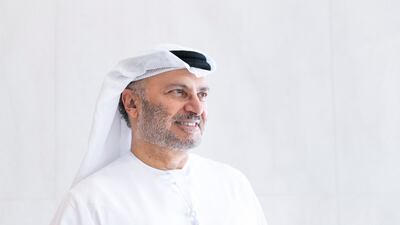The UAE hopes the nuclear talks under way in Vienna between Iran and world powers will succeed and wants to see a follow-up process of regional dialogue, Dr Anwar Gargash, diplomatic adviser to President Sheikh Khalifa, said on Thursday.
“We have our eyes on the JCPOA process,” Dr Gargash said, referring to the Joint Comprehensive Plan of Action, the formal name for the nuclear deal.
“We want to see a successful process … but we are hoping that process will also lead to some sort of agreement on a dialogue that involves more countries and that track in itself will also help in cementing this vision that we [the UAE] are trying to propagate of stability and prosperity in the region.”
Speaking to the Arab Gulf States Institute in Washington, Dr Gargash did not support the imposition of additional Iran sanctions if talks fail.
"I don't see further sanctions as a solution ...There are already enough sanctions on Iran," he said.
Earlier on Thursday, The Wall Street Journal reported the US is considering tightening economic sanctions if no compromise is reached in Vienna.
“Diplomacy is the way forward but at the same time, we don't have much time because there is real concern … about what happens on the nuclear side,” Dr Gargash said, calling on Iran to show more flexibility in the talks.
The senior Emirati official said Tehran could do more on regional issues, especially when it comes to a ceasefire in Yemen.
“From everything we hear, there is very little Iranian pressure on the Houthis towards a ceasefire,” he said.
With a new atmosphere of dialogue in the region, Iran should recognise the “new environment and be more productive in the region, whether that position is in Yemen or whether it is in Lebanon and Iraq".
Dr Gargash hailed bilateral ties with the US, calling Washington the UAE's “number one strategic ally".
As to the US position in the Middle East, he said Washington must strive for a balance between enabling its regional allies to work together while also avoiding long conflicts.
“We have no interest in embroiling America in another conflict like Afghanistan and Iraq … we have no interest in pursuing another long war in the region — in fact, our interest is trying to avoid it at all costs, even by trying to manoeuvre a very tense situation,” he said.
He warned, however, of dire consequences if the US were to disengage with the Middle East — a prospect he considered unlikely.
“If the United States decides to completely pull out of the region … it means the two concerns that we have are going to be problematic: one of them is [creating] vacuums and the other one is escalation. We need to avoid vacuums and we need to avoid escalation,” Dr Gargash said.
He also voiced concern over growing US-China competition.
“We are worried that there is a fine line between this acute competition and the new Cold War. We as a small state will be affected negatively by this, but we will not really have the ability to in any way affect this,” he said.
Dr Gargash framed the UAE’s diplomatic overtures to Turkey, Iran, Syria, the GCC and Israel as part of a bold reset in its approach to regional issues.
“It is important to manage these differences and divergent views and buttress other areas of co-operation,” he said.










